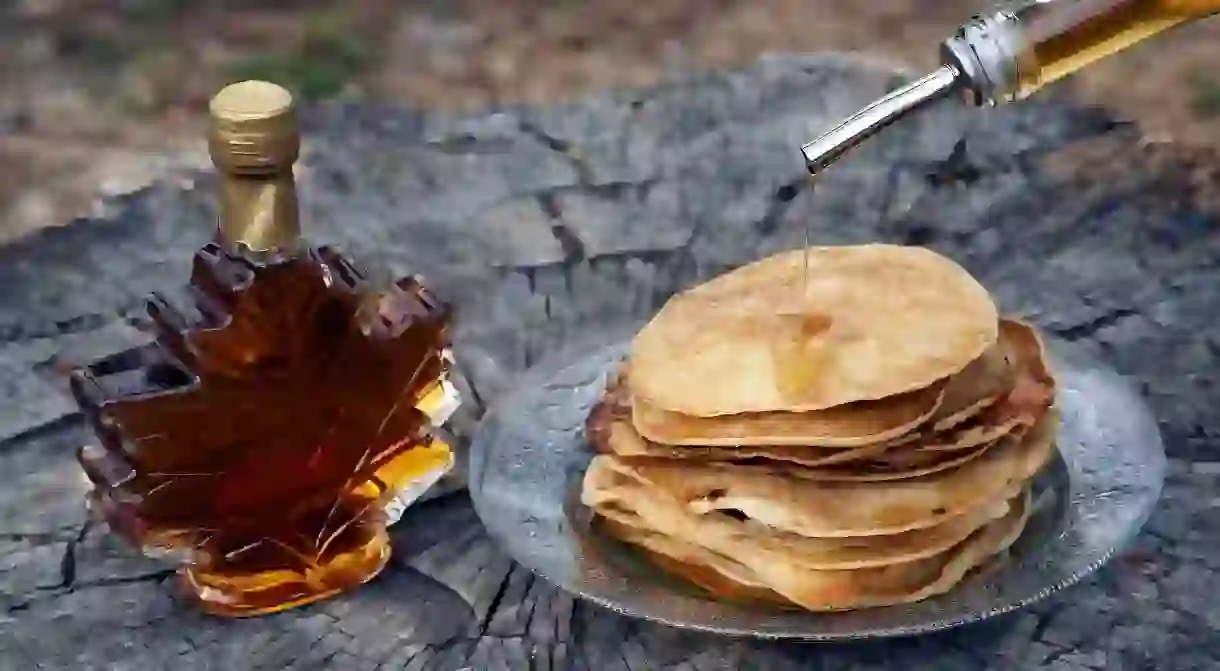11 Interesting Facts About Maple Syrup

Maple syrup, also known in Canada as liquid gold, is a truly special product. Created from the sweet sap of the maple tree, the leaf even emblazons the Canadian flag – but there’s much more to it than a breakfast ingredient to pour on your pancakes. Here are some of the most interesting facts about Canada’s favorite sweetener.
Most of the world’s maple syrup comes from Quebec

Though Canada is popularly known as the home of maple syrup, most of the natural product actually comes from a specific part of the country: Quebec. Today, the French-speaking province supplies roughly two-third’s of the world’s maple syrup.
Maple syrup is packed with nutrients and antioxidants
Though its sweet, rich flavor might make you think otherwise, maple syrup boasts plenty of health benefits. The syrup is filled with antioxidants as well as healthy minerals like zinc, magnesium, calcium and potassium.
40 gallons of maple sap makes one gallon of syrup
The cost of pure maple syrup makes a bit more sense when you realize that it takes roughly 40 gallons (150 liters) of maple tree sap to produce a single gallon (3.8 liters) of syrup.
There was once a major maple syrup heist
In 2011 and 2012, the maple syrup market was disrupted by the “Great Canadian Maple Syrup Heist.” Nearly 3,000 tons of maple syrup valued at roughly CAD$18 million (£10.4m) were stolen from Quebec suppliers.
The Iroquois people invented maple syrup
Maple syrup was invented by the Iroquois people, who are indigenous to northeastern America. They pioneered the tapping technology that drew sap from the maple tree, as well as processing techniques for transforming it into syrup and sugar crystals.
Maple syrup production is heavily weather-dependent
Like many agricultural crops, maple farming is very weather-dependent. Producers typically start tapping trees in early spring, when the trees and their sap begin to thaw. In a good year, the sugaring season will last between four and six weeks.
There are different grades of maple syrup

Maple syrup is categorized into different grades, which are determined based on the color and light transmission of the product. These factors are influenced by the time of season the sap is collected, not by how the maple syrup is processed.
In WWII, Canadians were encouraged to sweeten recipes with maple syrup
Due to rationing during the Second World War, Canadians were encouraged to sweeten their food with maple syrup instead of sugar. The country’s department of agriculture even released a collection of special wartime recipes that used maple syrup in lieu of processed sugar.
Maple sap is now mostly gathered with suction pump systems, not pails
While many picture maple sap being gathered by pails and spiles, this tradition is largely outdated, and most industrial maple tree farms rely on more sophisticated systems using suction pumps and tubes. This has been the primary maple sap-gathering method since the 1970s.
Maple syrup goes with more than just pancakes

Maple syrup is most traditionally used as a pancake or crepe topper, but the ingredient is exceptionally versatile. Use maple syrup in marinades, vinaigrettes, baking and even cocktails for an indulgent, natural sweetener.
A single tree can produce up to 15 gallons of sap per year
A single maple tree is capable of producing anywhere between 5 to 15 gallons (19 to 57 liters) of sap per season. This wide margin is dependent on a few factors, including weather, tree age and health. A healthy maple tree can produce sap for generations.













